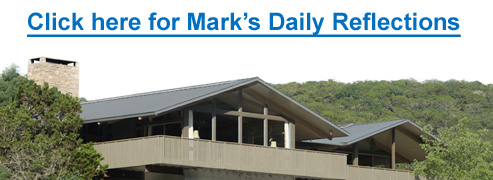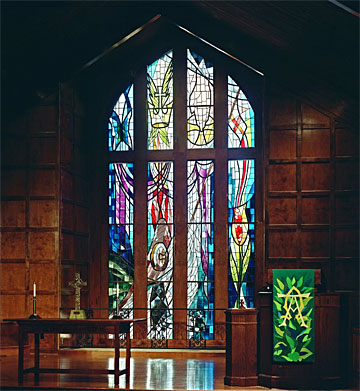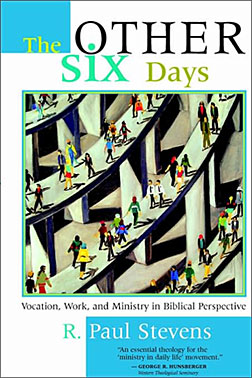My blog has moved! http://www.patheos.com/blogs/markdroberts/
|
 |
Twitter Feed for My Recent Blog Posts and Other Tweets |
My blog has moved! http://www.patheos.com/blogs/markdroberts/
|
Paradise Lost
By Mark D. Roberts | Monday, February 4, 2008
Part 4 of series: Being the People of God
Permalink for this post / Permalink for this series
In recent posts I’ve been reflecting on the creation accounts in Genesis 1 and 2, looking for insights into what it means for us to be the people of God. We’ve seen that God created humankind in community as male and female, and gave them the twin tasks of making more people and taking care of his creation. Though looking at creation from different perspectives, both Genesis 1 and Genesis 2 emphasize the essentially corporate dimensions of human existence. God did not create simply one person to enjoy perfect fellowship with God. Rather, God created two people, whom God intended to share in the work of managing the world, filling it with more people, and enjoying perfect intimacy with each other in the process. In Paradise they knew what it was to be God’s people together.
But because they chose to disobey God, Paradise was lost. Genesis 3 tells the sad story of human rebellion against God, of human desire to be like God in sovereignty and knowledge rather than living as his servants and stewards. After being tempted by the serpent, first the woman, and then the man along with her, ate of the forbidden fruit. In the next moments, God’s plans for his people unraveled, at least in the short run. From that moment onward, being God’s people became much more complicated and elusive.
 If you were to ask the average Christian, “What’s the first result of human sin?”, chances are that person would say something like, “Separation from God. Eternal separation from God. Death.” Theologically speaking, this is surely the right answer (see, for example, Romans 6:23). But in the narrative of Genesis 3, the first result of human sin is a breakdown in the relationship between the man and woman. Whereas in Genesis 2 the man and woman were naked and unashamed (2:25), in Genesis 3, sin leads to shame, and the first couple try to hide their now shameful nakedness from each other by using fig leaves. (Painting: “Adam and Eve” by Albrecht Dürer, 1507; fig leaves and all)
If you were to ask the average Christian, “What’s the first result of human sin?”, chances are that person would say something like, “Separation from God. Eternal separation from God. Death.” Theologically speaking, this is surely the right answer (see, for example, Romans 6:23). But in the narrative of Genesis 3, the first result of human sin is a breakdown in the relationship between the man and woman. Whereas in Genesis 2 the man and woman were naked and unashamed (2:25), in Genesis 3, sin leads to shame, and the first couple try to hide their now shameful nakedness from each other by using fig leaves. (Painting: “Adam and Eve” by Albrecht Dürer, 1507; fig leaves and all)
So, though it would be theologically correct to say that the first result of sin is brokenness in our relationship with God, Genesis emphasizes the implications of this brokenness for human relationships. The people whom God had created in his image to share intimacy together and to share in caring for the world together would be torn asunder by the results of their sin. To put it bluntly, sin makes it difficult, one might even say, impossible, for us to be the people of God.
If you’ve ever tried to be an active member of a Christian community, you’ve no doubt experienced the corruptive influence of sin. It’s not uncommon these days for Christian people to set out to form “perfect” Christian communities. They’re going to do church in a new way. They begin with lofty ideals, ideals that often flow from the spring of Scripture. Yet, without fail, these efforts to be the people of God soon confront relational challenges that threaten their success, if not their existence. Often those who began with such enthusiastic idealism end with embittered cynicism.
Every now and then, however, churches that were founded with enthusiastic hopes do not let the reality of sin destroy them. Several years ago I watched as a new church in my area exploded on the scene with dramatic and impressive growth, mostly among people in their 20s and 30s. But within the first years of its existence, its pastor committed adultery. I wondered if his sin would destroy the church he had worked so hard to plant. In fact, however, those leaders he had raised up to serve alongside him exercised unusual wisdom. They did not minimize the sin of their (former) pastor, but received his resignation and helped him to rebuild his life. They led the church through a relational minefield. The result, by God’s grace, was a stronger church.
By telling this story, I’m getting way ahead of myself. The main point I’m making here is that sin makes it extremely difficult to be the people of God. Indeed, it would be impossible apart from God’s grace. When we take the reality of sin seriously, then we won’t be surprised when it threatens to quash our efforts to be the people of God.
Sin impacts, not only our relationships with each other as God’s people, but also our efforts to act as God’s people in the world. More about this next time. . . .
Topics: Being the People of God | 1 Comment »
Sunday Inspiration from The High Calling
By Mark D. Roberts | Sunday, February 3, 2008
Whose Name Matters Most?
”Then they said, ‘Come, let’s build a great city for ourselves with a tower that reaches into the sky. This will make us famous and keep us from being scattered all over the world.’ “
The Babylonians sought to build a great city with a high tower. In ancient Mesopotamia, pagan temples featured a tower, known as a ziggurat, which was believed to be a residence for the gods. By building a giant tower, the Babylonians sought, not only to earn the blessing of their gods, but also to expand their own fame. The original Hebrew says, literally, that they wanted to make a name for themselves.
It’s natural for us to seek a “good name” for ourselves, to be respected by those who know us. But, as God’s people, our greatest passion should be for the glory of God’s name. We are to live in such a way that he receives praise because of us (Matt . 5:14-16; Eph. 1:12).
QUESTIONS FOR REFLECTION: Whose name matters most in your life? Do you seek your own fame first of all? How might you live for the praise of God’s glory today?
PRAYER: Dear Lord, it is my privilege and calling to live for your praise. May your name be glorified through me, in the way I speak—in my attitudes, in my behavior with my colleagues, when I’m with my family and friends. Give me a new passion for the glory of your name, so that I might live each day for you . . . beginning today. Amen.

Photo Copyright © Adam Kazmierski c/o istockphoto.com.
Topics: Sunday Inspiration | No Comments »
Cold in Texas
By Mark D. Roberts | Saturday, February 2, 2008
One of the things I’m growing to like about Texas is the winter weather. During the months of December, January, and February, the weather in the Hill Country often dips below freezing. But it doesn’t stay there for weeks at a time without a break. So we get a taste of real winter, but not a whole meal. Just about right for me.
The picture below was taken near a fountain at Laity Lodge, proof of some cold weather in Texas.

Topics: Texas, Sharing Laity Lodge | 1 Comment »
Creation, Take Two
By Mark D. Roberts | Friday, February 1, 2008
Part 3 of series: Being the People of God
Permalink for this post / Permalink for this series
Genesis 1 begins with an account of creation, one that begins to define what it means to be the people of God (see Wednesday’s post). Then, as if Genesis 1 weren’t there, Genesis 2 includes another story of creation. This second account looks at things from a different perspective, focusing on the experience of the first individual man (adam in Hebrew, from which we get the name Adam).
In Genesis 1 the creation of human beings emphasizes their innate community. Man “as male and female” reflect the image of God. Genesis 2 doesn’t use this “image of God” language, but focuses instead on the prior creation of the man. In light of this man-first-solo creation account, one might be tempted to reject what I said in reference to Genesis 1 about the essentially communal nature of humanity. After all, in Genesis 2 the man is created first, all by himself. But them we come upon on of the more surprising verses in Genesis, not to mention the whole Bible. In Genesis 2:18 God says, “It is not good that the man should be alone; I will make him a helper as his partner [or “helper fit for him” - ESV].” Whereas in Genesis 1 God consistently sees that his creation is good, indeed, “very good” (1:31), in Genesis 2 God recognizes the “not-goodness” of the man’s solitude. Humankind will only be what God intends it to be when people live in community with other people.
I’m not suggesting, by the way, that intentional solitude is always wrong. Jesus himself got away from the crowd to pray. If it was good enough for our Lord, it’s should be good enough for us. But, by God’s essential design, we are meant to share life with others. We are to be members of a people, not isolated individuals who come together only when we have to for reasons of necessity or convenience. “Peopleness” is inherent to our created nature.
In many cultures one almost wouldn’t have to say this. Throughout the world today, billions of human beings understand that they are members of a people. They are a part of something much bigger than themselves, something that gives them identity, meaning, and purpose. But Americans tend to be more individualistic. In fact, “individualism” is near the essence of America as a democratic nation, according Alexis de Tocqueville in his classic study of American culture, Democracy in America. Americans tend to see themselves less as part of a people and more as disconnected individuals. According to de Tocqueville:
Individualism is a mature and calm feeling, which disposes each member of the community to sever himself from the mass of his fellows and to draw apart with his family and his friends, so that after he has thus formed a little circle of his own, he willingly leaves society at large to itself. (Democracy in America, Volume 2, Section 2, Chapter 2).
 We Americans prize the “rugged individualism” of our cultural heroes like Teddy Roosevelt, Superman, and the Lone Ranger (who, curiously enough, was not really alone, but paired with Tonto).
We Americans prize the “rugged individualism” of our cultural heroes like Teddy Roosevelt, Superman, and the Lone Ranger (who, curiously enough, was not really alone, but paired with Tonto).
American Christians naturally read Christian faith through the lens of individualism. As a result, we emphasize personal salvation, personal spirituality, and personal devotion. We can even disparage church involvement as unnecessary because what really matters is that we each have a personal relationship with Jesus Christ.
Don’t get me wrong! I believe that having a personal relationship with Jesus Christ is absolutely essential and absolutely wonderful. Moreover, I am concerned that many churchgoing people might be missing out on this core relationship. But if we read the Bible carefully, we’ll see that a genuine relationship with Jesus Christ is personal and corporate. When we become a child of God through faith, we are adopted into a family with lots of sisters and brothers. We become, not just a person of God, but part of God’s people.
What a difference it would make if individual Christians and churches really believed this! We wouldn’t stop emphasizing one’s personal relationship with Christ. And we wouldn’t downplay the importance of personal discipleship. And we wouldn’t minimize one’s personal ministry in the world. But we’d see how personal relationship, personal discipleship, and personal ministry are essentially connected to corporate relationship, corporate discipleship, and corporate ministry. We’d understand that we’re to live out our faith Christ, not “alone,” but in fellowship with others. Even as it wasn’t good for the man to be alone in the garden, so it is for us.
Topics: Being the People of God | No Comments »
The Most Frequently Disobeyed Sign in the World???
By Mark D. Roberts | Thursday, January 31, 2008
Next time you visit your local gas station, check out the sign on the gas pump. Chances are you’ll see something like this:

Question: Have you ever obeyed this sign? Do you know anybody who does? Have you ever even thought about turning off your cell phone when you’re getting gas? Can you think of any sign that is disobeyed more frequently than this one?
Topics: Fun | 7 Comments »
Let’s Start at the Beginning
By Mark D. Roberts | Wednesday, January 30, 2008
Part 2 of series: Being the People of God
Permalink for this post / Permalink for this series
Fraulein Maria got it right in The Sound of Music: “Let’s start at the very beginning; a very good place to start.” This bit of wisdom works, not only for learning how to sing, but also for discovering what it means to be the people of God.
As you might have guessed, the beginning about which I speak is The Beginning, you know, of the “In the beginning God created the heaven and the earth” variety. If we look closely at the God’s creation, especially his creation of human beings, then we’ll head off in the right direction for our search for being the people of God.
 In Genesis 1 God creates the heavens and the earth, the waters and the sky, the land and the plants, the birds and the fish, and finally the animals. But then, at the center of his masterpiece, God creates human beings. Here’s how the passage reads in the NRSV:
In Genesis 1 God creates the heavens and the earth, the waters and the sky, the land and the plants, the birds and the fish, and finally the animals. But then, at the center of his masterpiece, God creates human beings. Here’s how the passage reads in the NRSV:
Then God said, “Let us make humankind in our image, according to our likeness; and let them have dominion over the fish of the sea, and over the birds of the air, and over the cattle, and over all the wild animals of the earth, and over every creeping thing that creeps upon the earth.”
So God created humankind in his image,
in the image of God he created them;
male and female he created them.
God blessed them, and God said to them, “Be fruitful and multiply, and fill the earth and subdue it; and have dominion over the fish of the sea and over the birds of the air and over every living thing that moves upon the earth.” God said, “See, I have given you every plant yielding seed that is upon the face of all the earth, and every tree with seed in its fruit; you shall have them for food. And to every beast of the earth, and to every bird of the air, and to everything that creeps on the earth, everything that has the breath of life, I have given every green plant for food.” And it was so. God saw everything that he had made, and indeed, it was very good. And there was evening and there was morning, the sixth day. (Genesis 1:26-31)
The word translated here as humankind is adam in Hebrew, which means “a human being” or “all humanity taken together.” In more traditional English adam is rendered man or mankind. We know that the text is speaking of human beings as a group, rather than one particular person, because of the plural “let them have dominion” (v. 26) or “in the image of God he created them” (v. 27).
So what do we learn in this passage that is relevant to our quest for the meaning of the people of God? Well, first of all we learn that there is a curiously close relationship between human beings and our Creator, since we were created in God’s image. Without going into detail about what this might mean, suffice to say that we are like God in a unique way in all of creation.
Second, we learn that God made people for a purpose: “to have dominion” over the creation (v. 26; vv 27-30). Verse 28 adds that human beings are to “be fruitful and multiply, and fill the earth.” So God made people to take care of the earth and its creatures and to make more people so that we might fill the earth. I expect we get a mixed grade in the first subject, caring for the earth and its creatures, but a higher grade in the second, filling the earth with people. According to the latest count, there are now 6,647,172,983 people on earth (most of whom are sitting in traffic somewhere right now, I fear.)
Third, Genesis 1 shows us that human beings find their completeness, not as isolated individuals, but rather in community with others. God did not create a single individual in his image. Rather, humankind reflects the image of God as male and female. It takes two to tango when it comes to God’s image. Christian theologians have seen a precursor to a Trinitarian understand of God in the story of Genesis. And, though this surely goes beyond the original sense of the narrative, it’s a valid theological reflection. God, who exists in three persons, Father, Son, and Spirit, is reflected in humankind as male and female, as a community, if you will.
To put it differently, the first creation story in Genesis shows that we are not just individuals who happen to get together with other individuals out of convenience. Rather, our very created nature involves being with others. We are created as a people, and in relationship to our being people together we find our individual identities.
Of course more could be said about Genesis 1 and the people of God. I expect there have been whole dissertations written on this subject. But, for now, we get some direction in our search for the significance of the people of God.
In my next post I’ll examine the second creation account in Genesis 2.
Topics: Being the People of God | 1 Comment »
Being the People of God: An Introduction
By Mark D. Roberts | Monday, January 28, 2008
Part 1 of series: Being the People of God
Permalink for this post / Permalink for this series
Today I’m beginning a new blog series called Being the People of God. I expect that this will be one of those on-again, off-again series, in which I put up some ideas for a few days, then focus elsewhere, only to return to the series later on.
Why am I doing this particular series at this time? I have two major reasons, one a matter of conviction and the other a matter of autobiography. I’ll start with the conviction.
Simply stated, I believe that it is absolutely crucial for Christians to know who we are as the people of God. This knowledge gives us much that we need for fruitful living, including: a sense of personal identity, a sense of purpose, a context for relationship, and an abiding hope for the future. In fact, I believe little is more important for Christians today than to know who we are as the people of God and to live out that identity in the world.
Unfortunately, many of us, perhaps even the vast majority of Christians, do not know who we are as the people of God. If you were to take a survey of Christians next Sunday after church and ask: “Who are the people of God?” I expect that many would answer “The Jews.” Now that particular answer is partly right, and crucially right, I might add. But it is inadequate, at least from a Christian point of view.
Others might answer the question “Who are the people of God?” by saying something like “the church” or “all Christians.” This answer gets more of the truth. So far, so good. But if you were to add a follow-up question, “What difference does it make that we are the people of God?” I fear you wouldn’t get much of an answer. You might hear something about heaven, or worship, or mission. All of these matter, but don’t begin to plumb the depths of meaning in the affirmation: “We are the people of God. ”
So I believe that it is absolutely crucial for Christians to know who we are as the people of God. And I also believe that most Christians do not have this knowledge, or if they have it, they don’t realize its radical and powerful implications. Put these two beliefs together and you have the beginning of a compelling rationale for a blog series.
But, of course, there are many, many valuable topics upon which someone like me could blog. So why am I picking this particular topic and this particular time? This brings me to the matter of autobiography.
 If you’ve been reading my blog for a while you can probably guess where I’m going. In October of 2007 I became the Senior Director and Scholar in Residence for Laity Lodge, a multifaceted ministry in the Hill Country of Texas. At the center of Laity Lodge is a retreat center called Laity Lodge (obviously enough). But the Laity Lodge “brand” also includes youth camps, family camps, publications, and web-based ministries, especially The High Calling of Our Daily Work.org. (Strictly speaking, both Laity Lodge and The High Calling.org are siblings in the ministry of the H. E. Butt Foundation.) All of the ministries associated with Laity Lodge are devoted to helping the laity encounter God so as to become agents of renewal in the world. (Photo: The entrance to Laity Lodge.)
If you’ve been reading my blog for a while you can probably guess where I’m going. In October of 2007 I became the Senior Director and Scholar in Residence for Laity Lodge, a multifaceted ministry in the Hill Country of Texas. At the center of Laity Lodge is a retreat center called Laity Lodge (obviously enough). But the Laity Lodge “brand” also includes youth camps, family camps, publications, and web-based ministries, especially The High Calling of Our Daily Work.org. (Strictly speaking, both Laity Lodge and The High Calling.org are siblings in the ministry of the H. E. Butt Foundation.) All of the ministries associated with Laity Lodge are devoted to helping the laity encounter God so as to become agents of renewal in the world. (Photo: The entrance to Laity Lodge.)
The word laity is used in English to denote non-clergy. In the church, the laity include everybody except the pastors or priests. Outside of the church, laity can mean non-specialist, though usually the adjective lay is used rather than the noun laity, as in: “The physics professor was able to explain quark theory for a lay audience.” The word laity comes to us by way of the French, and derives ultimately from the Greek word laikos which means “of the people.” People, in ancient Greek, is laos (pronounced today as LAY-oss with two syllables, not like the modern country Laos.)
Laity Lodge and its constellation of ministries is dedicated to the equipping, empowering, renewing, and sending of the laity, the people of God. I should hasten to add the Laity Lodge is not non-clerical or even anti-clerical. I am an ordained Presbyterian minister, for goodness sakes, a member of the clergy even though I’m not currently serving as a parish pastor. Many ordained ministers come to Laity Lodge each year. And one retreat is intended primarily for clergy. In truth, Laity Lodge seeks to touch the whole people of God, clergy and non-clergy, all of whom belong to the laos theou, the people of God (in Greek).
Since the notion of the people of God is so central to my new ministry, it seems only right that I should do an in-depth study on this theme. For me, of course, this means study based on Scripture. I plan to ask such questions as: What does the Bible teach about the people of God? Who are the people of God? What is their identity? What is their purpose? Their calling? How does being a part of the people of God impact individual Christians?
From a rhetorical point of view, I will be writing this series a Christian for Christians. I will talk about who we are as the people of God. If you are not a Christian, you are more than welcome to read and interact with what I’m saying here. If you’re seriously considering Christianity for yourself, it will help you greatly to understand what it might mean for you to become a member of God’s people. I recognize that Jews and Muslims might take umbrage at my claim that Christians are God’s people. I respect the fact that they would see things differently, and I hope they would respect my orientation as a Christian.
I also realize that some people, even Christians, might object to the implication that if Christians are the people of God then non-Christians are not. It’s common to hear the phrase “all God’s people” used in reference to all human beings. I don’t believe this notion of the people of God is to be found in Scripture, however. But now I’m getting ahead of myself.
More tomorrow . . . .
Topics: Being the People of God | 2 Comments »
Sunday Inspiration from The High Calling
By Mark D. Roberts | Sunday, January 27, 2008
“Walking with God”
“This is the account of Noah and his family. Noah was a righteous man, the only blameless person living on earth at the time, and he walked in close fellowship with God.”
Genesis 6 reveals the sorry state of humanity because of sin’s pernicious influence. Human beings not only did evil, but also desired it consistently. Except for Noah. He was someone who did and sought what was right. In fact, he walked with God.
Genesis does not tell us why Noah was special in this way. But it makes clear the connection between living rightly and living with God. If we want to live well, if we want to do what’s right, then we should seek a closer relationship with God (see John 15:1-8).
QUESTIONS FOR REFLECTION: Would people say that you are a righteous person? Why or why not? How closely do you walk with God in your daily life?
PRAYER: Sometimes, dear Lord, our world seems like the world of Noah. Evil is all around us and pulls at our own hearts. We need your help, gracious God, if we’re to be and act differently from the world. By your grace, may we be like Noah. May we walk so closely with you each day that we’re able to live rightly. Help us to walk with you at home and at work, at church and at play. As we do, let us reflect your truth and grace in this world, so that you might get the credit for who we are. Amen

One of my favorite places to walk with God, literally, was Crystal Cove State Park in Southern California. I’d go there often to walk and pray. Now I’ve got to find a new place for lengthy, relaxed fellowship with God.
The High Calling.org
Today’s post comes from The High Calling of our Daily Work.org, a website associated with Laity Lodge. I write a Daily Reflection for this website. If you wish, you can subscribe to The High Calling.org and receive the Daily Reflection in your email.
Topics: Uncategorized, Sunday Inspiration | 4 Comments »
You Know You’re in a Small Town When . . . A Ghost in the City Library Grabs the Headlines
By Mark D. Roberts | Saturday, January 26, 2008
This week The Boerne Star feature this headline: “Certified Ghosts? Boerne Public Library gets certificate of paranormal activity.” Other cities may have fires, murders, and official scandals. But we in Boerne have ghosts! And in the public library, no less.
 How do we know this isn’t just some silly ghost story? Well, a couple of weeks ago a group from Everyday Paranormal came to investigate. They found evidence of ghostly activity, including strange sounds and a book balanced precariously on a bookshelf. That evidence has been gathered and displayed at the Everyday Paranormal website. Really! You can check it out for yourself. (Photo: The Boerne library in the not-scary daylight.)
How do we know this isn’t just some silly ghost story? Well, a couple of weeks ago a group from Everyday Paranormal came to investigate. They found evidence of ghostly activity, including strange sounds and a book balanced precariously on a bookshelf. That evidence has been gathered and displayed at the Everyday Paranormal website. Really! You can check it out for yourself. (Photo: The Boerne library in the not-scary daylight.)
According to The Boerne Star, there’s no consensus on the identity of the library’s ghost. It could be the spiritual remains of Jospeh Dienger, the man who, in 1884, built the building in which the library is found. At first it was a market and a home. Then it was a restaurant and an office building. Finally, in 1989, the so-called Dienger Building was purchased by the City of Boerne, which turned it into a library in 1991. Others think the ghost is a woman whose abusive husband drank in a saloon that had once been housed in the Dienger building.
 Librarian Natalie Morgan didn’t seem particular disturbed the idea of a ghost haunting her workplace. As The Boerne Star reports:
Librarian Natalie Morgan didn’t seem particular disturbed the idea of a ghost haunting her workplace. As The Boerne Star reports:
“At least one person a day expresses interest in the ghost,” she said. She freely confessed that she’d very much hoped to have an otherworldly presence confirmed and was happy with the outcome. ”I love the certification,” said Morgan. “I think it makes the whole ghost legend even more fun.”
So, take that big cities and metropolitan areas! You think you have big news. We have a ghost in the Boerne library, which doesn’t look very scary when it’s covered with Christmas lights.
Topics: Small Town | 2 Comments »
God at Work: An Appendix for the Laity (Section 4)
By Mark D. Roberts | Friday, January 25, 2008
In the series: God at Work: A Review of the Book by David Miller
Permalink for this post / Permalink for this series
So far I have put up the following recommendations for lay people who want to help their churches be more supportive of their effort to live out their faith at work:
Recommendation #1: Invest in Christian fellowship and help your fellowship to deal with issues of faith at work.
Recommendation #2: Talk it up.
Recommendation #3: Gather people with common concerns and vision.
Recommendation #4: Help members of your church become familiar with faith at work resources.
Today I’ll add one more.
Recommendation #5: Ask your pastor for help.
David Miller, in God at Work, explains that most pastors aren’t especially helpful when it comes to faith at work efforts. There are many reasons for this, including: ignorance, insecurity, theological misgivings about business, lack of personal experience, etc. Of course there are also some pastors who are so invested in building their own church that they aren’t eager to have their people ministering outside of church.
I believe, however, that the vast majority of pastors truly want to help their people grow in their Christian discipleship as they live in the world, including the world of work. I expect that 90% of pastors would respond favorably to a request from a church member for help in this area. Of course the kinds of pastoral responses would vary widely. But something positive would come from a conversation in which a person says, “Pastor, I really need your help with this.”
Please notice carefully what I am saying . . . and not saying. If you’re a lay person in a church with a pastor who hasn’t done much with faith at work issues, I am NOT encouraging you to complain and criticize. Unfortunately, that’s the approach some folks take with their pastors, and it’s not helpful. Ask me for help with something and I’m glad to oblige. Come at me with criticism and I’m apt to hide behind my defenses. Pastors are human, after all. In fact, in my experience, pastors are often more sensitive than the average person, and are therefore quite vulnerable to criticism. So, if you approach your pastor, why not try something like this (in a nutshell):
Pastor, I’ve recently been learning a lot about my calling to serve Christ in my workplace. This is new for me, and I’m excited about it. But there is so much I don’t know. I need both support and guidance. I’m wondering if you could help. Now I know you have a lot on your plate already. I’m not necessarily asking you to do more things. But I thought I’d come to you for some ideas and direction. Also, I want you to know what I’ve discovered and how exciting it is for me.
As someone who served as a pastor for over 23 years, I can tell you that I’d have loved to get this sort of request when I was in parish ministry.
 Now, let me add that a wise pastor will not just offer help, but also will ask you to get involved in the solution. If you had come to me with this sort of request, I can imagine that I’d ask you to help organize a class or a workshop. Maybe I’d invite you to do a lay witness in church or to write an article for the church newsletter. This wouldn’t be a result simply of my busyness and not wanting to take on more things. It would flow from my commitment to lay ministry, both in church and in the world. (Photo: The chancel of St. Mark Presbyterian Church in Boerne, Texas, where I worship each week when I’m in town. I now have a pastor named John Watson. Technically, I’m still an ordained Presbyterian pastor. But in ordinary life I’m rather like any other lay person in the church.)
Now, let me add that a wise pastor will not just offer help, but also will ask you to get involved in the solution. If you had come to me with this sort of request, I can imagine that I’d ask you to help organize a class or a workshop. Maybe I’d invite you to do a lay witness in church or to write an article for the church newsletter. This wouldn’t be a result simply of my busyness and not wanting to take on more things. It would flow from my commitment to lay ministry, both in church and in the world. (Photo: The chancel of St. Mark Presbyterian Church in Boerne, Texas, where I worship each week when I’m in town. I now have a pastor named John Watson. Technically, I’m still an ordained Presbyterian pastor. But in ordinary life I’m rather like any other lay person in the church.)
When you talk with your pastor, you might even offer to do something proactive like organizing a class or whatever. When a member of my church came to me, not only with ideas, but with an offer to help, I was more than happy to team up with this person. Sometimes I’d send him or her to another church leader. But I often got involved myself, at least for a while.
If your pastor wants to help but isn’t sure what to do, you might suggest some of the resources I mentioned in my last post. Send your pastor to the website of R. Paul Stevens or to The High Calling of Our Daily Work.org. (In fact, to share a little secret, the leaders of The High Calling and I are working on a pastor’s page, that would have lots of resources for pastors. This is still on the drawing board, but I expect we’ll do it down the road a piece.)
As I look back on my ministry at Irvine Presbyterian, I feel good about much of what I did in support of lay ministry in the workplace. I could have done a short preaching series on faith at work, though I think it was effective to integrate faith at work illustrations into my ordinary preaching. I do wish we had done more in worship to highlight and celebrate workplace ministry. In a comment on one of my recent blog posts, Kyler says this:
In J.P. Moreland’s “Love Your God with All Your Mind”, he tells of a congregation that, week after week, had people of various professions come forward to be, not quite ordained, but “commissioned” for service–the businesspeople, the scientists, the artists, and so on. The service envisioned in Moreland’s particular example was primarily to be performed within the church (the scientists might be the congregation’s “go-to” people for insight on the creation/evolution/intelligent design debate, for example), but it is at least a start. There’s nothing preventing any congregation taking this model of commissioning “regular” members and applying it to service to the Kingdom of God performed outside of the church.
In retrospect, I wish we had done this sort of commissioning in worship. Perhaps some of my blog-reading pastors will do it and let me know how it goes.
Topics: God at Work | 1 Comment »
Eyewitness Testimony in John’s Gospel
By Mark D. Roberts | Thursday, January 24, 2008
Check out the latest post in the excellent series by James Arlandson, my first guest blogger. In typical fashion, James puts up a very thorough and readable look at eyewitness testimony in John’s gospel.
Topics: Guest Bloggers | No Comments »
God at Work: An Appendix for the Laity (Section 3)
By Mark D. Roberts | Thursday, January 24, 2008
In the series: God at Work: A Review of the Book by David Miller
Permalink for this post / Permalink for this series
Yesterday I put up my first suggestion for how lay people might help their churches be more supportive of their efforts to live out their faith in the workplace. That first suggestion was:
Recommendation #1: Invest in Christian fellowship and help your fellowship to deal with issues of faith at work.
Today I’ll add to it.
Recommendation #2: Talk it up.
If you’re a lay person in a church and want your church to do more to support you and others in workplace discipleship, then talk about it. Whether in organized classes and small groups, or in informal conversation at a retreat or on the church patio, talk about your vision and challenges. It could be as simple as saying, “Hey, I’m really learning that my work can be a context for ministry. Do you have any ideas about that?” You might be surprised what you hear. But even if the person you’re talking with has never thought about this before, chances are you’ll find yourself in a valuable conversation. God may very well use you to give others a new vision for faith at work discipleship.
The kind of talking it up I referring to here doesn’t take permission or time or money or anything complicated. It’s the sort of thing you could begin to do next Sunday. Now it’s possible, of course, that informal conversation will lead to something more planned and programmatic. Great! But if not, you’ll be helping to raise the consciousness of your fellow saints and, I’d expect, getting some of the support you desire. Remember, the church isn’t the program or the preacher; it’s the people. As much as faith at work should impact both program and preacher, the church can do a lot to support workplace ministry without either.
 In my experience, the notion of faith at work can be an exciting and empowering one for lay people. If you start talking about it, chances are others will pick up the conversation. You might be the small stone that leads to waves of renewal throughout your church.
In my experience, the notion of faith at work can be an exciting and empowering one for lay people. If you start talking about it, chances are others will pick up the conversation. You might be the small stone that leads to waves of renewal throughout your church.
Recommendation #3: Gather people with common concerns and vision.
This recommendation is an outworking of the Recommendation #1: Invest in Christian fellowship and help your fellowship to deal with issues of faith at work. One way to do this is to gather together people like yourself, people who seek to live out their faith at work.
Suppose, for example, that you implement recommendation #2 and start talking up lay ministry in the world. It wouldn’t surprise me if, before long, you found a number of people who shared your passion. You might propose a regular gathering for study, conversation, and prayer. Or you might get together with a couple other people to sponsor an adult education class at church. One person wrote to me with his experience at his church:
There were many ways [my church] equipped me for ministry at work. One of the most powerful was not directly from [the church itself], but [the church] nevertheless facilitated it. . . . So my specific answer to your question would be “even if your church does not directly offer this kind of training (which [my church] does), there are opportunities through mission partnerships to provide access and support to ministries that specialize in equipping disciples for workplace ministry.”
Recommendation #4: Help members of your church become familiar with faith at work resources.
If your church has a bookstore, suggest some faith at work books. Or donate a few to the church library. You might write a short piece for your church newsletter, pointing to resources you’ve found to be helpful. Etc. etc. etc.
There are many, many resources available. One was suggested in a comment on this blog series, by the author, no less. Greg Heylin has written a book called Work and Spirituality: Finding the Balance. I have not read this book, but I have ordered it. You can find a helpful overview with excerpts from this website. It looks very solid. And it will be interesting to see things from an Irish Catholic perspective.
 Of books I’ve read, I would heartily recommend The Other Six Days: Vocation, Work, and Ministry in Biblical Perspective by R. Paul Stevens. This book is written for a lay audience (thank goodness!) but it has quite a bit of biblical content. Paul Stevens is one of the real leaders in the faith at work movement. For several years he had one of the most interesting chairs at Regent College: the David J. Brown Family Professor of Marketplace Theology and Leadership. If you’re not familiar with Paul Stevens, be sure to check out his excellent website.
Of books I’ve read, I would heartily recommend The Other Six Days: Vocation, Work, and Ministry in Biblical Perspective by R. Paul Stevens. This book is written for a lay audience (thank goodness!) but it has quite a bit of biblical content. Paul Stevens is one of the real leaders in the faith at work movement. For several years he had one of the most interesting chairs at Regent College: the David J. Brown Family Professor of Marketplace Theology and Leadership. If you’re not familiar with Paul Stevens, be sure to check out his excellent website.
Finally, let me mention once again the website associated with my ministry at Laity Lodge. The High Calling of Our Daily Work.org is filled with practical wisdom, stories, and Bible studies to encourage people to live out their faith in the workplace. My Daily Reflection on this site regularly connects Scripture and work in a prayerful way.
Also, there is a High Calling blog network featuring blogs from Christians in various professional categories. Lots of great material here. And, if you’re so inclined, you can start your own “faith at work” blog through the High Calling blog network.
Tomorrow I’ll put up a couple more recommendations.
Topics: God at Work | No Comments »
God at Work: An Appendix for the Laity (Section 2)
By Mark D. Roberts | Wednesday, January 23, 2008
In the series: God at Work: A Review of the Book by David Miller
Permalink for this post / Permalink for this series
Okay, so here’s the scenario:
You’re a member of a church, part of the laity (non-ordained folk). You have come to believe that, even though you’re not ordained into “the ministry,” you have in fact been called into the ministry of Christ. Your context for ministry isn’t primarily the church, though you do serve in your church in a variety of settings. Rather, you understand that you are to be a ministry of Christ in the world, in your daily life, and, in particular, in your workplace. Thus you seek to live out your
You’d like to receive support, encouragement, and perhaps even training from your church for your ministry. But this isn’t happening. You don’t hear sermons that relate Scripture to the workplace. Prayers don’t ask God to bless and use people at work. There aren’t classes or fellowship groups dedicated to workplace ministry. That which you believe to be central to your Christian discipleship isn’t explicitly discouraged by your church. It simply isn’t mentioned.
Somehow this doesn’t seem right to you. Shouldn’t your church support you as you seek to serve the Lord at work? Shouldn’t you receive encouragement, even teaching about this crucial area of discipleship?
Since you’re not the pastor of the church, you can’t stand up next Sunday morning and start preaching on the importance of faith at work. If you did, you’d probably be escorted out by the ushers. But you’d like to do something to help your church be more supportive of your own efforts to minister at work. Moreover, you have a sense that many others in your church would appreciate and benefit from attention to faith at work issues. So what can you do? What steps can you take to help your church address these crucial issues, both for your own sake and for the sake of others?
Before I suggest some answers to this question, I want to thank those who have shared their ideas with me through commenting on my last post or through their emails. These contributions, both short and long, have been thoughtful and helpful.
 Furthermore, I would want to affirm “your” sense that the church should be with you in your effort to live out your faith at work. Sometimes, when your church isn’t offering much support, it might be tempting to leave the church behind. In fact, as David Miller shows in God at Work, much of the faith at work movement has happened outside of the church. Michael Lindsay, in his recent book Faith in the Halls of Power makes a similar observation. Now I have no objection to so-called parachurch ministries. In fact, I now work for one. But sometimes ministries that are supposed to be alongside the church (as “parachurch” means) end up leaving the church behind, to the detriment of all. If the world is going to be impacted by a faith at work movement, the church will be a necessary and central player in this movement.
Furthermore, I would want to affirm “your” sense that the church should be with you in your effort to live out your faith at work. Sometimes, when your church isn’t offering much support, it might be tempting to leave the church behind. In fact, as David Miller shows in God at Work, much of the faith at work movement has happened outside of the church. Michael Lindsay, in his recent book Faith in the Halls of Power makes a similar observation. Now I have no objection to so-called parachurch ministries. In fact, I now work for one. But sometimes ministries that are supposed to be alongside the church (as “parachurch” means) end up leaving the church behind, to the detriment of all. If the world is going to be impacted by a faith at work movement, the church will be a necessary and central player in this movement.
So then, back to the central question:
What can lay people do to help their churches help them live out their faith at work?
Recommendation #1: Invest in Christian fellowship and help your fellowship to deal with issues of faith at work.
I received input from a number of my blog readers, both in comments and in emails. Just about every person said something about the importance of Christian fellowship. Joseph Timothy Cook said: “Fellowship with others working in the same or similar arenas . . . . Get together and talk with your church friends.” RJS wrote, simply, “Reorient to view church as community rather than resource.” (Note: I will use the names as they appear in comments. Email names will remain confidential.)
It’s easy to see the church as an institution that is dependent on and even limited by the pastor. But, biblically speaking, the church is a body of members, each of which is essential and each of which contributes to the life of the whole body. Dependence on any one member is excluded by the mutual interdependence of the body.
Practically speaking, this means that as individual church members invest in Christian community, as they begin to live as members, not of a club, but rather of an interdependent organism, then they can encourage, support, challenge, and teach each other, without relying on their pastor(s) to do the job.
Getting more specific, Joseph Timothy Cook explains:
Fellowship with others working in the same or similar arenas…and specifically and intentionally talking about challenges to your faith in the workplace. I’m now retired, but during many years practicing law, I received great blessings from other Christian lawyers while discussing our challenges. And, I hope, I’ve been able to help others in a similar way.
I realize that many lay people have felt unsupported by their churches in their effort to live out their faith at work. But I have to wonder home many of these people were, for example, invested in committed small groups. It’s hard to imagine that a member of such a group wouldn’t find lots of support for living out their faith at work, unless, of course, they themselves never brought up the subject.
So, if you’re a lay person in a church and you desire support for your faith at work discipleship, get connected with other believers who share a similar desire. Talk with people in your line of work. Bring up the subject of work in your small group. Pray for others as they seek to live out their faith in the workplace. And ask for prayer as well. You may not be able to change the culture of your whole church, but you can begin to make a real difference in the lives of a few people, including yourself.
Tomorrow I’ll suggest some further recommendations.
Topics: God at Work | 1 Comment »
God at Work: An Appendix for the Laity (Section 1)
By Mark D. Roberts | Tuesday, January 22, 2008
In the series: God at Work: A Review of the Book by David Miller
Permalink for this post / Permalink for this series
 I’ve just wrapped up a five-part review of David Miller’s fine book, God at Work. In this strongly positive review, I offered only one substantial criticism: namely, that Miller’s recommendations for the church are oriented too much for clergy. In fact, he offers no specific recommendations for the laity, those who constitute more than 99% of the church. Without giving clergy a free pass for failing to offer greater support for people in their workplace ministry, it seems to me that if lay people wanted their church to help them in this matter, they could do many things to advance their cause.
I’ve just wrapped up a five-part review of David Miller’s fine book, God at Work. In this strongly positive review, I offered only one substantial criticism: namely, that Miller’s recommendations for the church are oriented too much for clergy. In fact, he offers no specific recommendations for the laity, those who constitute more than 99% of the church. Without giving clergy a free pass for failing to offer greater support for people in their workplace ministry, it seems to me that if lay people wanted their church to help them in this matter, they could do many things to advance their cause.
I plan to offer a possible appendix to God at Work. In this appendix I’ll include some recommendations for lay people who would like the church to support them in their workplace calling. But before I offer my recommendations, I’d like to hear from you, my readers. Either by adding a comment to this blog entry, or by sending me an email, please give me your answers to the question:
What can lay people do to help their churches support them as they seek to live out their faith at work?
I look forward to your input. Stay tuned . . . .
Topics: God at Work | 4 Comments »
A Review of God at Work: The History and Promise of the Faith at Work Movement by David W. Miller (Section 5)
By Mark D. Roberts | Monday, January 21, 2008
In the series: God at Work: A Review of the Book by David Miller
Permalink for this post / Permalink for this series
Yesterday I suggested that David Miller’s recommendations for clergy are basically fine, though I think lay people have more power to influence clergy, and therefore churches, than Miller seems to think. This leads to perhaps my only significant unhappiness with God at Work, a book I have found to be, overall, most helpful and worth reading. I highly recommend God at Work to all readers, both clergy and lay.
Nevertheless, it almost seems at times as if David Miller has bought into the idea that “the church = the clergy.” It is most telling that his excellent chapter on recommendations for the church contains five, explicit, strong recommendations for clergy, and zero explicit, strong recommendations for laity. Though I fervently agree with Miller that the church has a great opportunity to make a difference in FAW, and though I fervently agree that pastors can and should contribute to this difference, I also believe that, in the end, the church is not the clergy, but the people of God, the laos, of which the laity (non-clergy) are the vast majority. Pastors can be hard-headed and hard-hearted. But if lay people want to have more integrated lives, if they want to be equipped for workplace ministry, if they want to live out their faith at work, then they ultimately have the power to make this happen, in spite of what pastors might do to the contrary. At least they do in Protestant churches.
I do not mean to pit the clergy against the laity, however. On the contrary, as I’ve said above, I believe most clergy sincerely want to help their people live out their faith in all sectors of life. If pastors aren’t dealing with issues of workplace discipleship, it’s because they haven’t realized how much it matters.
I can easily imagine a scenario in which a lay person makes an appointment with a pastor in order to share some challenges at work. In the conversation, the lay person says, “Pastor, I really need some help with this. Have you every thought about dealing with this sort of thing in your sermons? Or could you do a Wednesday evening class on business ethics? It would be wonderful if you did.”
Sure, some pastors would get defensive. But many would say, “You know, that’s a helpful suggestion. What specific things might I preach about?”
And, yes, other pastors would feel insecure, realizing that they don’t know how to talk meaningfully about workplace issues. The healthy ones might say, “You know, that’s a fine suggestion. But, honestly, I’m not sure how I’d go about it. Would you be willing to help me? Perhaps we could do some research and reading and get back together in a couple of weeks to share what we learned.”
Of course a pastor who truly believed in lay ministry might go a step further and say, “I’m willing to incorporate more work related material into my sermons. But, to tell you the truth, I’m not sure I have the expertise or even the time to teach a class on business ethics. Would you be willing to help organize such a class? You don’t have to teach it. But maybe you could gather some others together to help. And you could figure out some speakers we could invite? Since you’re every bit as much a minister as I am, would you be willing to take this on?”
Okay, I’ll admit this imaginary conversation sounds a bit canned. But I have participated in many conversations just like it. No rose colored glases here. Just lots of experience as a pastor listening to my people.
David Miller concludes God at Work in this way:
The church and the theological academy have a choice: they can sit on the sidelines, ignore the [FAW] movement, and let it pass them by, or they can learn from it, engage it, and help shape the theology and practice of faith at work. The church and the theological academy . . . have the chance here to participate in the FAW dialogue, help set the agenda, address the Four E’s, and thereby influence societal structures by affecting and even transforming individual lives, corporations, and the broader marketplace. The church and the academy can offer theological resources and practical tools to equip those whose calling is to serve in and through the marketplace. For the church to do anything less is to abandon millions of Christians for five-sevenths of their week, and to abdicate responsibility for and influence over this important sphere of society. Indeed, active participation in the transformation of individual employees, their workplaces, and the overall marketplace may be one of the most powerful means to help feed the hungry, clothe the naked, and welcome the stranger (p. 153).
 To this I would add an enthusiastic “Amen!”, though with one exception. I see in this paragraph hints of the kind of problem I referenced earlier. Consider, for example, the sentence that reads: “For the church to do anything less is to abandon millions of Christians . . . .” Stop! This sentence seems to imply that the church is something other than millions of Christians. In fact, the church is these same millions of Christians. Yes, of course the church is an institution. And, yes, of course it has its many gatekeepers (usually but not always the clergy). But, theologically speaking, the church is not the buildings and the bosses. The church is the people of God, the body of Christ. Thus if the church does anything less than Miller recommends – recommendations with which I heartily agree – then it’s not that the church is failing millions of people, but rather that the millions of people who make up the church are failing themselves. Ultimately, of course, they are failing God and his kingdom. (Photo: The High Calling website is meant to encourage ordinary Christians to live out the high calling of their daily work. Most of the writers on the site, by the way, are lay Christians, as are all of those who work on it regularly, expect for me.)
To this I would add an enthusiastic “Amen!”, though with one exception. I see in this paragraph hints of the kind of problem I referenced earlier. Consider, for example, the sentence that reads: “For the church to do anything less is to abandon millions of Christians . . . .” Stop! This sentence seems to imply that the church is something other than millions of Christians. In fact, the church is these same millions of Christians. Yes, of course the church is an institution. And, yes, of course it has its many gatekeepers (usually but not always the clergy). But, theologically speaking, the church is not the buildings and the bosses. The church is the people of God, the body of Christ. Thus if the church does anything less than Miller recommends – recommendations with which I heartily agree – then it’s not that the church is failing millions of people, but rather that the millions of people who make up the church are failing themselves. Ultimately, of course, they are failing God and his kingdom. (Photo: The High Calling website is meant to encourage ordinary Christians to live out the high calling of their daily work. Most of the writers on the site, by the way, are lay Christians, as are all of those who work on it regularly, expect for me.)
To use theological language for my critique of God at Work, I’m concerned that Miller’s ecclesiology, his doctrine of the church, is formed too much by the institutional status quo and too little by biblical teaching. If we really believe that the people of God are the church, that the members really are the body of Christ, that the Spirit is given not just to the clergy, but to all believers, then the way forward might look quite a bit different. It would be filled with hope for workplace discipleship, whether or not clergy found the wherewithal to lead the movement. I believe that lay people have vastly more power than they realize, not because they currently experience this power, and not because they never feel frustrated by clerical resistance, but because, in the end, they are the laity. They are the laos, the people of God. They are the church, filled with the very Spirit of God. And it is God, above all, who seeks for his people to live out their faith at work.
Topics: God at Work | No Comments »















